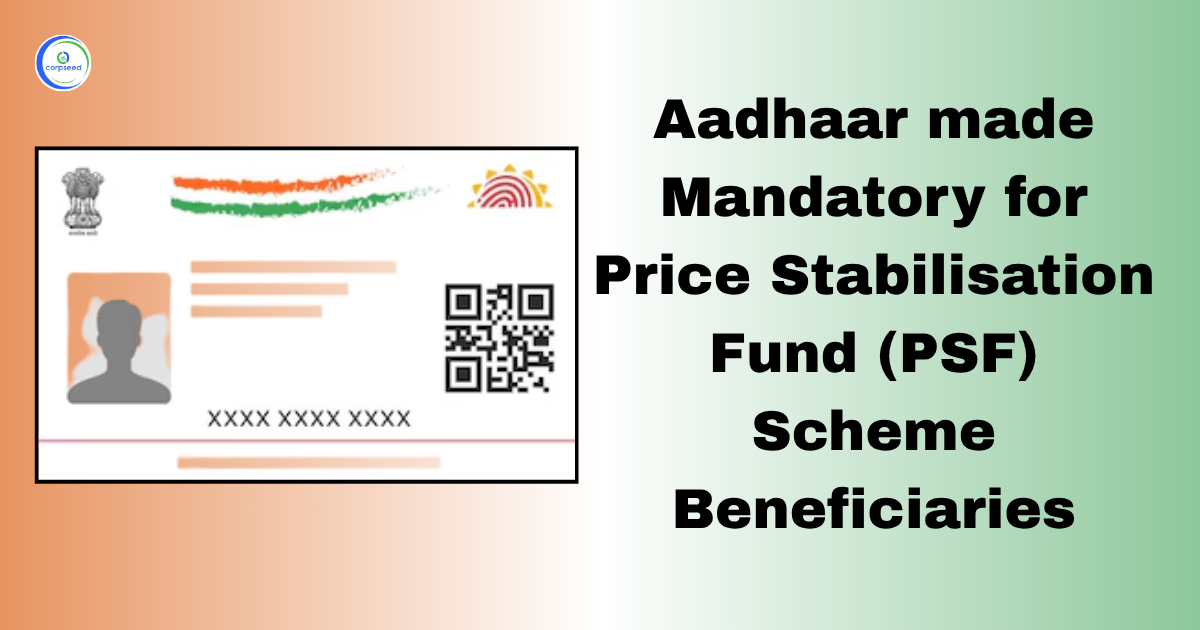The Ministry of Consumer Affairs, Food, and Public Distribution (MoCAF&PD) issued a notification on making Aadhaar mandatory for the PSF Scheme. This rule will help farmers and beneficiaries to get payments only after Aadhaar verification. It helps stop fake claims, provides clarity, and makes the process fast and direct. The Department of Consumer Affairs, along with agencies such as NAFED and NCCF, will manage this under the new Aadhaar PSF Scheme 2025. This step supports fair distribution of government benefits and strengthens trust in India's digital governance system.
What is the Price Stabilisation Fund (PSF) Scheme?
The Price Stabilisation Fund Scheme is a government scheme or initiative that helps and guides in keeping the prices of key crops, such as vegetables, pulses, and other crops, stable. This allows farmers to get the right price for their crops and protects consumers from paying extra in the market. The Consolidated Fund of India provides the funds for this work. This PSF Scheme ensures both farmers and consumers are protected from sudden price changes.
The Department of Consumer Affairs made Aadhaar verification mandatory for farmers to receive payments. The Aadhaar PSF Scheme 2025 ensures transparency, stops fraud, and helps genuine farmers get timely financial support directly into their bank accounts.
Table of Contents
- What is the Price Stabilisation Fund (PSF) Scheme?
- Purpose of the Notification Regarding Aadhaar for PSF Scheme
- Importance of Aadhaar in the PSF Scheme
- Aadhaar Authentication for PSF Scheme
- Identity Verification for Non-Aadhaar Holders
- Verification by Designated Officers
- Aadhaar Authentication Failure and Alternate Verification
- Legal Framework and Effective Date
- Conclusion
Purpose of the Notification Regarding Aadhaar for PSF Scheme
The government stated that using Aadhaar helps in:
- Make the process for obtaining subsidies and benefits easy.
- Avoiding multiple documents for identity proof.
- Promoting transparency and efficiency.
- Ensuring genuine beneficiaries receive the benefits.
The Department of Consumer Affairs administers the Price Stabilisation Fund (PSF) Scheme, which supports farmers through procurement operations managed by agencies like NAFED and NCCF. Since payments to farmers come from the Consolidated Fund of India, establishing identity through Aadhaar ensures that benefits reach the right person.
Importance of Aadhaar in the PSF Scheme
Here is why Aadhaar is important in the PSF Scheme 2025:
- Aadhaar makes PSF Scheme payments clear and easy to track.
- It stops fake or duplicate farmers from getting benefits.
- Money goes straight to farmers' bank accounts quickly without delay.
- It helps the government save funds and use them properly.
- Every transaction is linked to a verified person, keeping the system safe and honest.
- Farmers can show their Aadhaar instead of many papers, making the process fast and simple.
Aadhaar Authentication for PSF Scheme
The notification states that any person who wants to get benefits under the PSF Scheme must either:
- Undergo Aadhaar authentication, or
- Provide proof of possession of an Aadhaar number.
If the person does not have an Aadhaar number, an enrolment application must be submitted. For children, the parent or legal guardian must give consent for enrolment. The implementing agencies, such as NAFED and NCCF, must help in Aadhaar enrolment by:
- Setting up enrolment centres at convenient locations.
- Coordinating with Registrars.
- Providing facilities to enroll or update Aadhaar details.
Identity Verification for Non-Aadhaar Holders
Until Aadhaar is assigned, beneficiaries can still receive their benefits by showing valid identity documents. The required documents include:
For beneficiaries aged 18 years or more (without Aadhaar number)
They must show:
- Enrolment Acknowledgement Slip (EID) – a proof that the enrolment process is completed.
- Any one photo identity document from the list below:
- Voter ID Card (EPIC) issued by the Election Commission of India.
- Ration Card.
- Caste or Domicile Certificate issued by a Gazetted Officer or Revenue Officer (not below the rank of Tahsildar).
- Medical or Insurance ID Card issued by a government body or public sector unit.
- Indian Passport.
- Marksheet or Certificate of 10th or 12th class issued by a recognized education board.
- Identity Card of a serving or retired government or PSU employee.
- Disability Certificate or UDID Card issued by the Department of Empowerment of Persons with Disabilities.
- Driving Licence issued in India.
- Birth Certificate issued by the officer-in-charge of a Child Care Institution (for children under protection).
- For foreign nationals:
- Overseas Citizen of India (OCI) Card.
- Registration Certificate for Tibetan refugees.
- Passport of Nepal or Bhutan (for nationals of these countries).
- Indian Visa with a Foreign Passport or a Long-Term Visa (for others).
- For beneficiaries with legal guardians, documents like an adoption order or a court-issued guardianship certificate under:
- Guardians and Wards Act, 1890
- Juvenile Justice Act, 2015
- National Trust Act, 1999
- Rights of Persons with Disabilities Act, 2016
- Any other document specified by the Department of Consumer Affairs.
The Aadhaar requirement in the PSF Scheme allows these alternate identity proofs to ensure that no farmer or beneficiary is denied their benefits. The rule promotes transparency, ease of access, and fair distribution while ensuring that every beneficiary's identity is genuine and properly verified.
Verification by Designated Officers
The designated officer from the Department of Consumer Affairs must:
- Check the enrolment request status using the EID on the myAadhaar portal.
- Confirm that the EID is valid and not rejected.
- Verify the documents presented by beneficiaries.
- Seek help from other government authorities to confirm document authenticity.
Aadhaar Authentication Failure and Alternate Verification
Sometimes Aadhaar authentication may not work correctly or adequately due to poor fingerprint quality issues, iris-scanning errors, or technical issues. To ensure farmers continue to receive their benefits under the Price Stabilisation Fund (PSF) Scheme, the government has allowed for easy, safe alternative verification methods. These include:
- If the first biometric method fails, another biometric option or a One-Time Password (OTP) sent to the registered mobile number can be used. If both methods fail, farmers can still get their PSF Scheme benefits through offline Aadhaar verification.
- This includes checking the Aadhaar Secure QR Code on the Aadhaar card, eAadhaar, or Aadhaar letter. Another option is using the Aadhaar Paperless Offline e-KYC document, which can be downloaded from the UIDAI website or the mAadhaar app.
- Offline verification is done by scanning the QR code or verifying the UIDAI-issued digital signature. This process confirms the authenticity of Aadhaar numbers and ensures that every genuine beneficiary receives their benefit without delay.
Legal Framework and Effective Date
The Aadhaar rule for the Price Stabilisation Fund Scheme is based on Section 7 of the Aadhaar Act, 2016. This section helps clarify the system, prevents misuse, and ensures that only genuine, deserving people receive government assistance. The Aadhaar requirement in the PSF Scheme was published in the Gazette of India on 29 October 2025. From this day, all farmers and beneficiaries under the Price Stabilisation Fund Scheme must use Aadhaar for getting their benefits safely and efficiently.
Conclusion
By making Aadhaar mandatory for the PSF Scheme is a big step by the government to make the system fair, simple, and transparent. It ensures that only real farmers receive help and that no one misuses the benefits. With Aadhaar, money is quickly and safely deposited into the farmer's bank account. There is no delay or mix-up in getting payments. It also reduces unnecessary paperwork and helps the government save money. If someone's Aadhaar number doesn't work, there are other safe and straightforward ways to verify their identity. This new rule under the Price Stabilisation Fund (PSF) Scheme helps farmers get help faster and builds trust in the government's digital system. It makes the whole process easy, fair, and clear for everyone. It truly supports honest distribution and strengthens India's transparent governance.
This portion of the site is for informational purposes only. The content is not legal advice. The statements and opinions are the expression of author, not corpseed, and have not been evaluated by corpseed for accuracy, completeness, or changes in the law.
BOOK A FREE CONSULTATION
Get help from an experienced legal adviser. Schedule your consultation at a time that works for you and it's absolutely FREE.



_for_Compressed_Biogas_(CBG)_Corpseed.webp)





_Scheme_in_India_Corpseed.png)